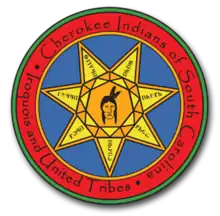Eastern Cherokee, Southern Iroquois, and United Tribes of South Carolina
The Eastern Cherokee, Southern Iroquois and United Tribes of South Carolina, Inc. or ECSIUT is a state-recognized Native American Indian group in the state of South Carolina under the SC Code Section 1-31-40 (A) (7)(10), Statutory Authority Chapter 139 (100-111) and obtained this status on February 17, 2005.[1] The ECSIUT is organized to promote interest in scholarly research as well as foster accurate documentation of genealogical, biographical, and historical records surrounding the Cherokee and other Native American tribes originating in South Carolina. For twenty years the ESCIUT hosted an annual Native American film festival in Columbia, South Carolina which gave exposure to indigenous film makers.[2]
 | |
| Total population | |
|---|---|
| 400 | |
| Regions with significant populations | |
| Languages | |
| English, Cherokee, formerly Tuscarora, and Catawban languages | |
| Religion | |
| Christianity, Traditional Indigenous | |
| Related ethnic groups | |
| Cherokee, Tuscarora, Cheraw, Lumbee, and Choctaw. |
Government
According to South Carolina law, Native American Indian groups are defined as "a number of individuals assembled together, which have different characteristics, interests and behaviors that do not denote a separate ethnic and cultural heritage today, as they once did. This group is composed of both Native American Indians and other ethnic races. They are not all related to one another by blood. A tribal council and governmental authority unique to Native American Indians govern them."[3] The ECSIUT was formerly headquartered in Richland County, South Carolina and led by the late Native American activist, Dr. William Moreau Goins, who founded the group and served as Chief and CEO up until his passing in November 2017.[4] In April of 2020, it was announced that the ECSIUT had elected archaeologist Lamar Nelson as their new Chief and CEO.[5] Nelson previously served on the board of the ECSIUT and is well known within the state for having aimed to preserve and educate the public about Native American history and lifeways since the early 1990s. The group is presently headquartered out of Spartanburg, South Carolina and is aiming to bring back the annual the film festival and continue work on other projects.
History
According to the ECSIUT, the group traces its history back to several families that were classified as “free people of color” by the United States Census despite the fact that they were ethnic Native Americans and still practiced and passed down traditions of their culture.[6] These families were descendants of Cherokee that lived within the Cherokee Lower Villages that once existed in the upcountry of South Carolina such and at the time were still living along the Tugaloo River.[7] Surnames carried by these individuals included Allens, Adairs, Nicholsons, and Martins. Descendants in the ECSIUT today also trace their heritage back to individuals with the surnames, Sizemore, Butler, Oglesby/Ogilvy, and Thompson.[8] By 1884, these families had separated from the Chuaga and Old West Minister churches in their area and formed their own congregation called the Cross Roads Baptist Church and not long after built a school adjacent to the church.[9] The church became a gathering center for the descendants and many modern members of this group can find ancestors buried in the churchyard.[10] It has been observed that the markers used in the yard are similar to those found in the “Cherokee Graveyard” in Wallhaha, South Carolina. [11] Today, members of the ECSIUT can trace their heritage to the aforementioned families in South Carolina or other ancestors that were identified as Cherokee on the east coast. [12] Membership is also open to individuals of multi-tribal ancestry.[13] Individuals within the ECSIUT today are of diverse ethnic backgrounds and do not represent a singular ethnic culture as historic tribes once did. Though many members seek to represent, preserve, and educate others about their respective ancestor's traditions and history.
References
- "South Carolina's Recognized Native American Indian Entities | Commission for Minority Affairs". cma.sc.gov. Retrieved 21 October 2019.
- "20th Annual Native American Indigenous Film Festival of Southeast". onecolumbiasc. Retrieved 21 October 2019.
- "139102. Definitions." Chapter 139. Commission for Minority Affairs. Article I. State Recognition of Native American Indian Entities. (Statutory Authority: S. C. Code Section 13140(A)(10)). Page 2. Retrieved 21 October 2019.
- "Obituary of Dr. William Moreau Goins". legacy.com. Retrieved 21 October 2019.
- "New tribal leader". www.pagelandprogressive.com. Retrieved 18 April 2020.
- "State Recognized Groups". NASCA. Native American South Carolina Archive. Retrieved 15 August 2020.
- "State Recognized Groups". NASCA. Native American South Carolina Archive. Retrieved 15 August 2020.
- "State Recognized Groups". NASCA. Native American South Carolina Archive. Retrieved 15 August 2020.
- Goins, William Moreau (22 October 2016). "About Us". Archived from the original on 22 October 2016. Retrieved 21 October 2019.
- Goins, William Moreau (22 October 2016). "About Us". Archived from the original on 22 October 2016. Retrieved 21 October 2019.
- Goins, William Moreau (22 October 2016). "About Us". Archived from the original on 22 October 2016. Retrieved 21 October 2019.
- Goins, William Moreau (22 October 2016). "Enrollment". Archived from the original on 22 October 2016. Retrieved 15 August 2020.
- Goins, William Moreau (22 October 2016). "Enrollment". Archived from the original on 22 October 2016. Retrieved 15 August 2020.